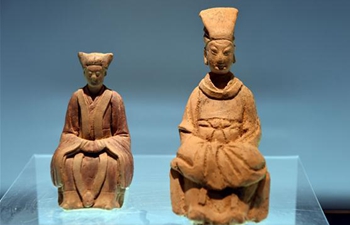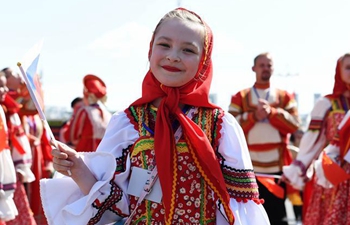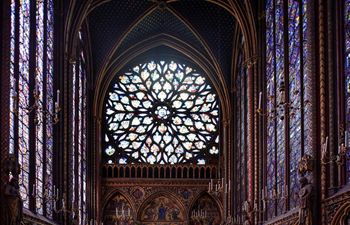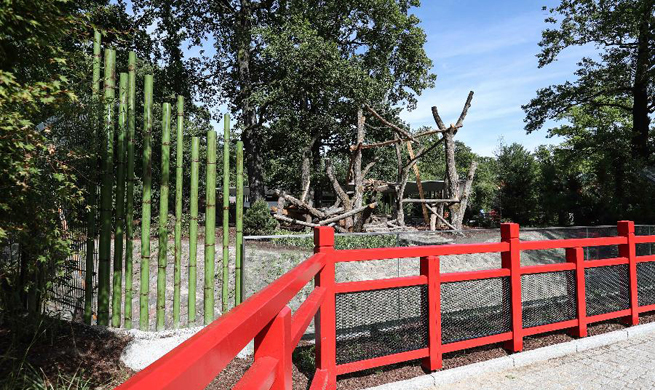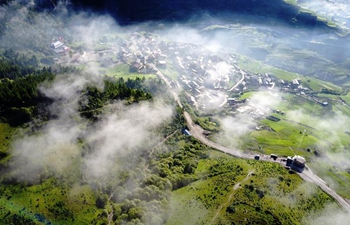by Alessandra Cardone
ROME, June 22 (Xinhua) -- Moroccan-born Youness, Dulcineida from Cape Verde and Igiaba born in Rome to parents who fled Somalia, the three were among a group who were fighting for one thing on Thursday before Rome's Pantheon, the right to be an Italian, as they share a common background as children of immigrants.
The timing was right: a bill granting citizenship to foreign children born or raised in Italy is under discussion in the Italian senate. Passed by the chamber of deputies in Oct. 2015, the bill would need the green light from senators to become law.
Yet, the debate developed into a quarrel between parties in favor, Prime Minister Paolo Gentiloni's center-left cabinet plus leftist opposition forces, and those against, namely center-right Forza Italia party, anti-immigration Northern League, and anti-establishment Five Star Movement.
The last time senators discussed the bill on June 15, the debate also ended up in a brawl, which led to the Education Minister Valeria Fedeli's light medication in the infirmary.
The minister joined the Thursday's event, which was organized by associations of second-generation youths such as "Italiani Senza Cittadinanza," or "Italians without citizenship" in English, which Youness belongs to.
Youness Warhou came to Italy from Morocca at 14 years old. He spoke four languages, and was now a second-year engineer student in the city of Reggio Emilia.
Youness said they did so because they felt "forgotten" by the Italian state, to which they think they belong.
"We feel marginalized by our own society, and cut off from many chances such as competing in public exams for state employment, or simply taking part in elections," Warhou told Xinhua.
Lacking Italian citizenship also meant putting some dreams aside. "After graduating from high school, for example, I was not allowed to apply for the admission to Italy's military academy... My dream was to become a pilot, but I could not pursue it," he said.
Dulcineida and Igiaba were also among the demonstrators who were holding banners, Italian national flag colors (green, while and red) balloons, or wearing slogan T-shirts.
Dulcineida from Cape Verde has lived in Italy for 10 years, and here was where her children were born and raised.
Igiaba was born in Rome in 1974 to parents who fled Somalia, and did not want the current generation of immigrant children to live in the same "limbo" she experienced before becoming Italian.
As children of immigrants, they were there to call for eased citizenship process and better recognition of second-generation immigrants.
Two educators held a large placard made with their pupils of school Di Donato, one of the most multi-ethnic institutes in the Italian capital earlier that day.
They started the sentence "I am Italian..." and let children finish in their own words: "... because I like the Italian landscape," one child wrote; "because Italy is my reality," put another, and still "I love pizza" or "the Italian language is easier."
Although festive, the event also showed people strongly resolute in their battle. "I have been following this issue for years, and I think Italy needs to take a leap in quality," Igiaba Scego, who is an award-winner author renowned for her writings on African-Italian identity, told Xinhua.
"Italy already has a globalized society, and it is time to work on coexistence. The citizenship law is a law of civilization, and the country needed it 15 years ago already," she stressed.
Along with immigrants with children born or raised here, there were teachers, union representatives, and people who just sympathized with the struggle.
One of them, 29-year-old American-Italian Camilla, considered herself "privileged," for having got the citizenship from her mother.
Most of her peers were not so lucky. "We are talking of people who live, study, work, and pay their taxes in Italy. They need to be recognized," she said.
Under the current law, children born to foreign parents can apply for the Italian citizenship between their 18 and 19 birthdays.
Yet, they must also prove they have lived here legally and continuously their whole life, which can be a very difficult process in a country with a heavy red tape such as Italy.
The new law would ease the rules, basing the citizenship right on a tempered "right of the soil" principle, and on the cultural participation of the child.
As such, the Italian citizenship would be granted to all children born in Italy to foreign parents with one of whom must have a residence permit, and all those entering the country before 12 years old and attending the Italian school system for at least five years.
According to latest data by Leone Moressa Foundation, the reform would give citizenship to almost 800,000 young people: namely, 634,592 foreign minors born in Italy since 1998, plus 166,000 born abroad but attending Italian schools since at least five years.
The figure would represent a large majority of 976,000 foreign children born in Italy in the last 17 years, the foundation estimated on data by the education ministry and the institute of statistics.
Some 518,000 more people each year may benefit from the new law, experts estimated.
The rally at the Pantheon ended with second-generation children singing the Italian national anthem. The green-white-red balloons were freed in the air, and filled the sky.
According to organizers, they were the most proper symbol of current second-generation immigrants, whose life would remain "hung by a thread."




